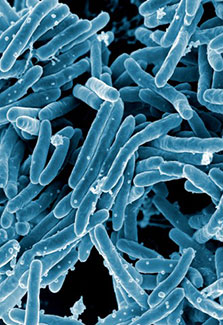Fogarty awards $10M for early-career researchers to establish independent careers in global health
September / October 2019 | Volume 18, Number 5
To bolster promising global health research careers, Fogarty and its partners are awarding up to $9.9 million over five years through two career development programs. The grants will help ensure that advanced postdoctoral scientists and junior faculty have a pathway to independence, with protected time for research activities under the guidance of experienced mentors in developing countries and in the U.S.

Image courtesy of NIAID
New grant awards for early-career
researchers will support studies on a variety
of health-related disciplines, including a
number related to tuberculous.
Recipients of 14
Emerging Global Leader Awards hold junior faculty positions and research scientist appointments at institutions in Bangladesh and India, and across Africa - in Ghana, Mali, Nigeria, South Africa and Tanzania. Five additional U.S. scientists supported through the
International Research Scientist Development Award (IRSDA) will be conducting studies in China, Malawi and South Africa, with a majority of their supported time spent at institutions in low- and middle-income countries (LMICs).
The programs fund research relevant to the health priorities of the host countries, covering all health-related disciplines. Projects addressing women’s health will explore perinatal depression in adolescents, hypertension during pregnancy and improving cervical cancer detection. Many will be exploring solutions in the field of HIV and related infections, for instance working to better understand and treat HIV-related pain, identify biomarkers for Kaposi’s sarcoma, reduce HIV transmission for young women, improve home-based ART interventions and explore treatments for HIV-associated Multicentric Castleman disease. They will also study treatments for HIV-associated tuberculous meningitis, detection of multidrug-resistant TB, interactions between antiretroviral and tuberculosis drugs, and sex differences in immune response and risk for developing TB.
The new investigators will be researching chronic conditions, such as locally relevant innovations in cardiovascular disease care, and treatments for Burkitt lymphoma and building a mobile application to help detect lung cancer. Some grantees will look into issues unique to their regions, countries and communities: sickle cell disease in infants, the role of genetics in craniofacial and dental anomalies, treatment for Guillain-Barré syndrome, and causes of
Shigella flexneri infections.
Partners from across NIH are supporting the Center’s career development programs. Funding for the new awards was provided by the National Cancer Institute (NCI), National Institute on Dental and Craniofacial Research (NIDCR), National Institute of Mental Health (NIMH), National Institute of Neurological Disorders and Stroke (NINDS) and NIH Office of Research on Women's Health (ORWH). Also participating in the related funding announcements are the National Human Genome Research Institute (NHGRI) and National Institute of Environmental Health Sciences (NIEHS).
Both programs are open for future applications, with upcoming deadlines for Emerging Global Leaders on November 7 and for IRSDA on March 6.
2019 Emerging Global Leader Awards
2019 International Research Scientist Development Awards
More Information
To view Adobe PDF files,
download current, free accessible plug-ins from Adobe's website.